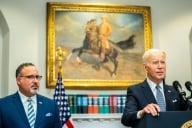You have /5 articles left.
Sign up for a free account or log in.
The College of Southern Maryland is located about an hour’s drive from Washington, and it’s midway between two U.S. Navy bases. That means the area served by the community college is home to thousands of federal employees -- and the impact of the ongoing federal shutdown on its students is unavoidable, said Maureen Murphy, the college’s president.
“The ripple effect is significant. There are very few people who are untouched,” she said.
The college is one of a handful of institutions that are offering emergency aid to students who are suddenly facing challenges paying for college because they or their parents are furloughed or not being paid. At the College of Southern Maryland, more than 100 students by last week had taken advantage of options such as deferred payment plans to deal with those unexpected challenges.
The Office of Federal Student Aid is unaffected by the government shutdown, so federal student loans and Pell Grants are being disbursed like normal. But for students at institutions like Southern Maryland or others elsewhere who depend on income from the federal government, the shutdown is creating sudden challenges paying for tuition, books and fees that would otherwise be affordable. Many of the students affected are well outside the Beltway and attend colleges across the country.
“People believe this is primarily concentrated in the D.C. or Virginia area,” said Dawn Medley, associate vice president for enrollment management at Wayne State University. “There are lots of federal offices all over the United States. People are being affected, and they didn’t know to plan for this.”
Detroit, where the Wayne State campus is located, is home to a Delta Airlines hub and a large number of Transportation Security Administration employees in particular.
Medley said the university has seen a handful of students drop classes this semester. Wayne State announced emergency aid early in January in the hopes that it could let students know about their options to cover those costs. The university has been offering students deferred payment plans and emergency loans using institutional funds. So far, the campus has extended that aid to about 10 students but expects more to take advantage if the shutdown continues.
“We’re working with students coming now who didn’t think it would take that long or thought their parent would be back to work by now,” Medley said. “Every day we’re having new ones pop up.”
Justin Draeger, president and CEO of the National Association of Student Financial Aid Administrators, said financial aid offices deal with situations all the time where a parent is laid off during the semester or a family member accumulates unexpected medical debt. The temporary nature of the shutdown makes it a unique circumstance, he said -- federal workers should eventually get paid when the shutdown ends. But it creates uncertainty for their ability to pay for essential costs in the short term.
Murphy, from Southern Maryland, said financial aid administrators have seen student parents who are afraid they won’t be able to continue paying for childcare and the cost of classes during the shutdown.
“I don't think anybody realizes how thoroughly it disrupts the lives of people who are struggling to get an education,” she said.
The college’s winter semester doesn’t begin until next week, meaning it’s tough to tell how enrollment may be affected, but Murphy expects some sort of decline. The college has also tried to assist students in the meantime in applying for state and federal aid. Many have tried updating their federal student aid or FAFSA applications -- an endeavor hindered this month for some students by problems with the IRS website.
Other colleges are taking their own steps to help students during the shutdown. Thomas Edison State University in Trenton, N.J., said this week it would cover the tuition for any Coast Guard students enrolled at the college who haven’t received tuition assistance because of the shutdown. The University of Indianapolis said this week it would partner with a local brewery to provide meals to federal workers.
And Southern New Hampshire University announced a $1 million special fund for those without their regular income.
The federal government, meanwhile, issued guidance last week to federal employees who have student loans about what steps to take during the shutdown. Their options, the department said, include postponing payments through a deferment or forbearance. Or they could enroll in an income-driven repayment plan that will lower their monthly payments.
Colleen Campbell, associate director of postsecondary education at the Center for American Progress, said the most important step for those borrowers is to call their loan servicer themselves to discuss their situation.
“The Department of Education is not telling servicers who is furloughed,” she said. “There are tools in place that should be able to assist furloughed borrowers.”








